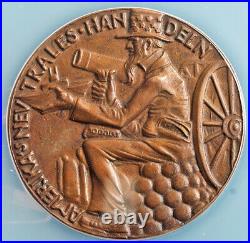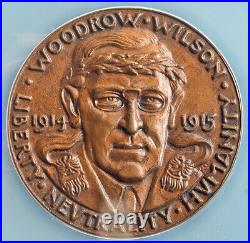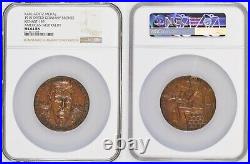1915, Germany/USA. Rare Woodrow Wilson/American Neutrality Medal. NGC MS-64




Rare "Woodrow Wilson/American Neutrality" Medal. Mint Year: 1915 Mint Place: Munich Medallist: Karl Goetz Reference: Kienast-149. Certified and graded by NGC as MS-64! Woodrow Wilson/American Neutrality (from the perspective of Germany) during 1914/1915. Material: Cast Bronze Weight: 91.26gm Diameter: 57mm.
The neutral "dealing" of Amerca. World War I broke out in July 1914, pitting the Central Powers (Germany, Austria-Hungary, the Ottoman Empire, and later Bulgaria) against the Allied Powers (Britain, France, Russia, Serbia, and several other countries).
The war fell into a long stalemate with very high casualties on the Western Front in France. Both sides rejected offers by Wilson and House to mediate an end the conflict. From 1914 until early 1917, Wilson's primary foreign policy objectives were to keep the United States out of the war in Europe and to broker a peace agreement. He insisted that all U. As a neutral power, the U.
Insisted on its right to trade with both sides. However the powerful British Royal Navy imposed a blockade of Germany. Wilson passively accepted this situation. In response to the British blockade, Germany launched a submarine campaign against merchant vessels in the seas surrounding the British Isles. In early 1915, the Germans sank three American ships; Wilson took the view, based on some reasonable evidence, that these incidents were accidental, and a settlement of claims could be postponed until the end of the war.
In May 1915, a German submarine torpedoed the British ocean liner RMS. Killing 1,198 passengers, including 128 American citizens. Wilson publicly responded by saying, there is such a thing as a man being too proud to fight. There is such a thing as a nation being so right that it does not need to convince others by force that it is right. Wilson demanded that the German government "take immediate steps to prevent the recurrence" of incidents like the sinking of the.
In response, Bryan, who believed that Wilson had placed the defense of American trade rights above neutrality, resigned from the Cabinet. In March 1916, the SS. An unarmed ferry under the French flag, was torpedoed in the English Channel and four Americans were counted among the dead. Wilson extracted from Germany a pledge to constrain submarine warfare to the rules of cruiser warfare, which represented a major diplomatic concession. Interventionists, led by Theodore Roosevelt, wanted war with Germany and attacked Wilson's refusal to build up the army in anticipation of war. After the sinking of the. And the resignation of Bryan, Wilson publicly committed himself to the what became known as the "preparedness movement", and began to build up the army and the navy. In June 1916, Congress passed the National Defense Act of 1916, which established the Reserve Officers' Training Corps and expanded the National Guard.Later in the year, Congress passed the Naval Act of 1916, which provided for a major expansion of the navy. Rare Woodrow Wilson/American Neutrality Medal. NGC MS-64" is in sale since Wednesday, July 21, 2021. This item is in the category "Coins & Paper Money\Coins\ World\Europe\Germany\German States (up to 1871)". The seller is "coinworldtv" and is located in Wien.
This item can be shipped worldwide.
- Composition: Silver
- Country/Region of Manufacture: Germany
- Certification: NGC
- Denomination: Medal
- KM Number: See detailed description for full data!
- Grade: MS 64
- Year: 1915
